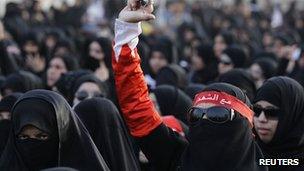Human rights 'crisis' in Bahrain despite reform pledge
- Published

Human rights are still being violated in Bahrain, despite promises of reform, according to Amnesty International.
Ahead of the Grand Prix in Bahrain this weekend, Amnesty warns "no-one should be under any illusions that the country's human rights crisis is over".
Bahrain insists it is "very much committed to implementing" the recommendations of its own report into the handling of protests in 2011.
More than 40 people died in last year's unrest and 1,600 were arrested.
Amnesty's Hassiba Hadj Sahraoui says Bahrain's reforms have "only scratched the surface".
"The authorities are trying to portray the country as being on the road to reform but we continue to receive reports of torture and use of unnecessary and excessive force against protests," said Ms Sahraoui.
Clashes over Formula 1
Amnesty details the case of an 18-year-old student, Hassan 'Oun, who was arrested in January.
He says he was forced to stand for 11 hours, his feet were beaten with a hosepipe and he was threatened with rape.
The group also reports that a 14-year-old boy and an 81-year-old woman died after tear gas was fired into their homes.
Amnesty says it recognises the security forces are sometimes faced with violence, but is is urging them to respect international human rights law.
There have been violent clashes between police and protesters on the outskirts of the capital Manama this week as Bahrain prepares for the Formula 1 Grand Prix.
Demonstrators are calling for the sporting event to be cancelled and have sprayed walls with anti-Formula 1 graffiti.
In London, two protesters climbed onto the roof of Bahrain's embassy on Monday, to draw attention to the fate of imprisoned opposition activists.
Bahraini response
In November, the Bahrain Independent Commission of Inquiry (BICI) report acknowledged numerous human rights abuses and systematic torture of detainees as security forces put down anti-government protests.
In response, King Hamad promised lessons would be learned and laws would be reformed to protect freedom of speech and other basic rights.
The Bahraini government has responded to Amnesty's claims by stressing that it has begun the process of implementing reforms.
"The notion that the BICI report and what has been done are a whitewash is difficult to reconcile with what taken place over the past year and the sweeping and significant reforms that have taken place and are still ongoing," Fahad al-Binali from Bahrain's Information Affairs Authority told the BBC.
Detailing what the government says it has already put in place, he says:
- All dismissed public sector employees and students have been reinstated
- There has been a major overhaul in legal and law enforcement systems
- A victims' fund and civil settlement initiative to compensate relatives of victims of last year's unrest have been created
- An ombudsman and inspector general have been appointed to investigate claims of abuse
- A special prosecution unit to look at the responsibility of senior personnel in abuse claims has been set up.
But Amnesty says the BICI findings have proved inadequate and what it calls "piecemeal reforms" have not gone far enough.
"The establishment of the BICI was a real breakthrough and raised expectations that things would be different in Bahrain. It is time for the Bahraini government to match its public pronouncements with genuine actions," said Ms Sahraoui.
The human rights group is calling on the Bahraini government to release all prisoners of conscience and to hold accountable people suspected of carrying out torture and abuses.
To date, it can only point to a handful of low-ranking officers who have been put on trial.
Amnesty cites the cases of eight policemen who have been charged in connection with the death of protesters, but who remain in their jobs while they are investigated.